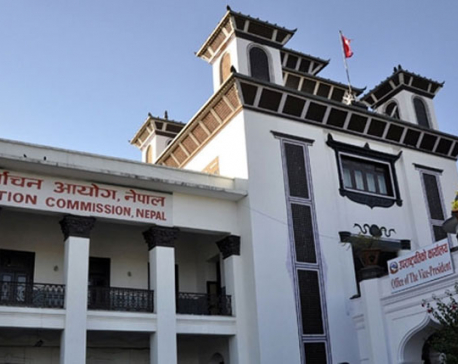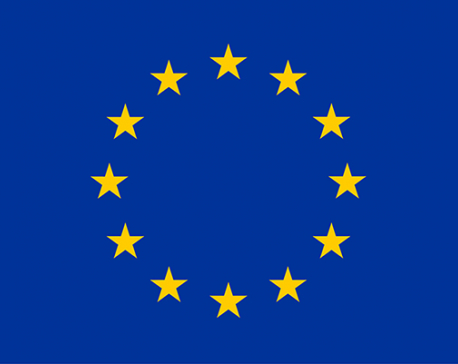
OR
Govt decisions, EC role over poll code draw flak
Published On: December 2, 2017 08:45 AM NPT By: Ananta Raj Luitel
KATHMANDU, Dec 2: At a time when the Election Commission (EC) has sought clarifications from some broadsheet newspapers for publishing an advertisement with a picture of CPN-UML Chairman KP Sharma Oli soliciting votes, the government has taken some mysterious decisions on the expansion of roads and announcement of public holidays.
The government decision on November 30 to divert the East-West Highway to spare Hetauda has drawn the attention of the public. The government has also tried to please voters by announcing a public holiday for January 11, on the day popularly known as Prithvi jayanti, after a long gap.
“Taking such decisions at a time when the election code of conduct is in effect has called into question the impartiality of the polls,” senior advocate Chandra Kanta Gyawali, who is also known as an election expert, told Republica. “Such decisions should be taken either before the elections or after conducting the polls,” he said adding, “Even though the government has to respect public sentiments and take some decisions, it cannot be taken as acting in a well-intentioned manner at this time.”
According to Gyawali, the decisions raise questions about not only the impartiality of the government but also the intentions of the EC.
Even though the putting forth of demands and fulfilling the concerns of various communities is a fundamental trait of inclusive democracy, there must be a right time for every decision, Gyawali further said. “There should not be any debate over the fulfillment of the concerns of the public but such concerns cannot be addressed by a caretaker government,” he added.
Section 7 of the Election Code of Conduct 2017 has restricted the government from bringing new policies and programmes without the approval of the EC.
The provision states: The government, public organizations and local authorities should not announce, approve or operate any new plan or programme except continuing the old programmes and operating human resources for the same purpose.
Implementing and operating policies and programmes in an adverse situation of natural calamity or other circumstances which may go out of the control of the government may be a different matter.
But this does not mean the government has the right to announce public holidays and approve any other programme to please the voters. The EC has the power to impose up to Rs 100,000 fine on anyone violating the code of conduct.
Stating that the decisions of the government have drawn the attention of the EC, Election Commissioner Sudhir Kumar Shah informed that the EC has already sought clarifications from the government.
“Our further decisions would be based on the clarifications of the government,” Shah added.
The current government has turned into a caretaker government with the announcement of the polls and it is its duty to support the EC in conducting the elections in a free and fair manner.
According to Article 298(10) of the Constitution, it is the duty of the government to create a conducive environment for holding free and fair polls.
The decisions have also raised questions over the EC’s fairness.
If the EC does not implement the code of conduct impartially as between the powerful and the week, a question may araise over the EC’s discretion as well.
“This government should not have taken such decisions,” former chief election commissioner Neelkantha Upreti commented. “These decisions raise questions not only over the impartiality of the elections but also about the functioning of the Election Commission,” he added.
You May Like This

Parties have role in stopping poll vioence: EC
KATMANDU, Dec 1: Concerned over the ongoing attacks targeting election candidates and election campaigns in various parts of the country, the... Read More...

EC summons EU mission chief over poll observation code violation
KATHMANDU, Nov 24: The Election Commission (EC) has summoned Željana Zovko, chief of the European Union Observation Mission to Nepal, after... Read More...

Govt breaches poll code, appoints 4 VCs
KATHMANDU, March 3: A day after the Election Commission (EC) enforced the election code of conduct, Prime Minister Pushpa Kamal Dahal... Read More...










Just In
- Heavy rainfall likely in Bagmati and Sudurpaschim provinces
- Bangladesh protest leaders taken from hospital by police
- Challenges Confronting the New Coalition
- NRB introduces cautiously flexible measures to address ongoing slowdown in various economic sectors
- Forced Covid-19 cremations: is it too late for redemption?
- NRB to provide collateral-free loans to foreign employment seekers
- NEB to publish Grade 12 results next week
- Body handover begins; Relatives remain dissatisfied with insurance, compensation amount







Leave A Comment